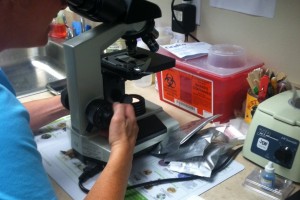Parasites can make your pet miserable, but in severe cases can lead to extensive health complications such as anemia, infection, hair loss, diarrhea, vomiting, respiratory problems, organ failure, and even death. Prevention, recognition, and speedy treatment are the best methods to keep pets and pet parents happy and healthy.
Fleas
Fleas are tiny insects that feed on blood from animals. Not only are fleas a nuisance, but they can also cause tremendous anxiety and disease in both cats and dogs.
All pets in the home should be treated, even if fleas are only seen on one pet, since only 5% of the total flea population in a home is made up of adults. Furniture, bedding, and high traffic areas should be cleaned thoroughly, especially in severe cases.
Riversong stocks a number of prevention and treatment options for cats and dogs. We offer a number of pharmaceutical options as well as more “green” products. There is no product that is perfect for every pet and household, so chat with our staff and we can tailor prevention or treatment options to the needs of your pet.
Heartworms
Heartworm disease, caused by the parasite Dirofilaria immitus, is a serious and life-threatening infection. Mosquitoes transmit heartworm larvae during blood feeding. The larvae matures in the subcutaneous tissue and migrates to the blood vessels. Adult heartworms can live in the host for several years and treatment options are not without risk. Monthly prevention and a yearly blood parasite screen are the best defense against heartworm disease. A blood parasite screen can be done in just a few minutes by testing a small sample of your pet’s blood in our lab. For more about heartworm disease, visit the American Heartworm Society’s Website.
Riversong carries a number of heartworm preventives. Our staff will be able to help identify which option will best fit your pet’s lifestyle.
Other Internal Parasites
 Tapeworms, Whipworms, Roundworms, and Hookworms are internal parasites that can lead to a number of symptoms, such as weight loss, diarrhea, intestinal obstruction, blood loss, vomiting, and even death. Even well-cared for pets can develop intestinal parasites and unfortunately some of these parasites are transmittable to humans. Fortunately, these internal parasites can be identified through an in-house laboratory test using a small sample of fecal matter. Identifying which internal parasite a pet has ensures the most appropriate de-wormer is administered.
Tapeworms, Whipworms, Roundworms, and Hookworms are internal parasites that can lead to a number of symptoms, such as weight loss, diarrhea, intestinal obstruction, blood loss, vomiting, and even death. Even well-cared for pets can develop intestinal parasites and unfortunately some of these parasites are transmittable to humans. Fortunately, these internal parasites can be identified through an in-house laboratory test using a small sample of fecal matter. Identifying which internal parasite a pet has ensures the most appropriate de-wormer is administered.